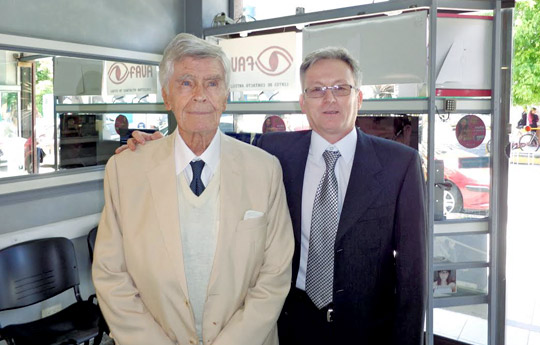Portrait and homage
In “Elogio de la sabiduría” [Praising wisdom], different authors analyse the contributions of the Argentine philosopher Mariano Bunge, one of the most important figures of philosophy of science in the world.
They met more than thirty years ago in La Plata, when Denegri was studying for his doctorate at the Universidad Nacional de La Plata [National University of La Plata]. Later on, together with other colleagues, Denegri founded the Asociación Platense de Epistemología (APE) [Association for Epistemology from La Plata], and asked Bunge to be the Honorary President.
Their friendship continued, strengthened and years later, Denegri, principal researcher at the CONICET, decided to publish “Elogio de la sabiduría [Praising wisdom]. Essays in homage to Mario Bunge in his 95º anniversary”, a compilation of essays written by 27 authors who analysed Bunge’s work from different perspectives.
Mario Bunge, mathematical physicist, philosopher and epistemologist, provided theoretical foundations for scientific disciplines.
“Mario Bunge has a personal thought that has transcended the limits of philosophy of science and has influenced most sciences” Denegri states and adds that his main contribution was “he, in some way, provided philosophy with scientific status”.
Why did you decide to write about Mario Bunge?
Firstly because we developed a great friendship; and secondly because he deserves a second tribute book in Argentina for his international career in philosophy of science and as one of the most important current epistemologists.
The book gets together texts from authors of different fields of knowledge. Why have you decided to include several approaches?
This is the second tribute book to Mario Bunge. The first one was published when the author turned 80 and it coincided with a visit he made to Mar del Plata to teach a course in sociology of science. In this book, to celebrate his 95th anniversary we wanted to show the different disciplines which were influenced by Bunge’s work. In this new publication there are different topics, ranging from purely philosophical ones and philosophy of science, to epistemology and physics. The authors of the articles provide contributions from their area of expertise, such as physics, biology, philosophy, history, anthropology, cosmology and law, to name a few.
Which would you say are Bunge’s main contributions within the framework of this analysis of his work?
Mario Bunge is actually a mathematical physicist. Since he was 18 he had philosophical, epistemological and social questions. At that age, he was one of the founding members of the Universidad Obrera Argentina [University of Workers in Argentina]. Currently, he is the most important philosopher of science and his work is focused on concrete stances. He could be defined as a materialist, a realist, a systematic, an emergentist and above all a science philosopher. He is the father of modern systematic philosophy and a defender of science.
How can Bunge’s influence be found in the authors that you chose?
It can be found mainly in their systematic stances. During the XX century and so far this XXI, we could highlight three or four important contributions of known philosophers in this discipline: Popper, Kuhn, Lakatos, and others. And at this level, Mario Bunge is known for his contributions to philosophy of science, especially because he clarified the premises of several disciplines. The most important part of his stance is that he began his study from his discipline, physics-mathematics – in almost all sciences and provided what we know as theoretical foundations of each disciplines. For this reason, in the book, there are authors who even contributed from the perspective of law and how systematic stance has influenced his or her area. Besides, some authors show how a scientific discipline can be analysed with these systematic premises to provide it with theoretical foundations.
In your opinion, how did Bunge’s analysis contributed to the debate of so-called the pseudosciences?
He has been severely critised for that topic and his stance is very clear: he is a defensor of science as an activity and practically has had a contrary opinion, supported by several arguments, against pseudosciences. For him, they are “macaneo” [lies] or in the case of psychoanalysis, it would be a “psicomacaneo”[psycho lie].They do not conform with what he defines a scientific methods, among other arguments.
Personally, how would you describe Mario Bunge?
At first glance, Mario seem to be a surly person and inaccessible. Nevertheless, he has always been willing to contribute, especially with Argentine colleagues. We have known each other for 30 years and he has always answered every e-mail. He has always been open to suggestions and provided support. He is a good person, generous and with a bright mind that goes on shining at 95.
Are there any projects for a new study on lines that have not been explored?
Not at this moment, but Mario Bunge is long-lived and is active. The last time he came I told him “Mario, no hay dos sin tres” [Never two without three]. When he turns one hundred, we are going to publish another book. Bunge’s work is really big and his influence is found over and over. His studies are beyond this book, which was a way to honour him.
Training
Guillermo M. Denegri is a professor at the Universidad Nacional de La Plata (UNMdP) [National University of La Plata] and principal researcher at the CONICET, and leads the Laboratorio y Grupo de Investigación en Zoonosis Parasitarias en la Facultad de Ciencias Exactas y Naturales de la Universidad Nacional del Mar del Plata. He holds a PhD in Zoology, Philosophy and a Doctorate in Natural Sciences at the Universidad Nacional de La Plata (UNMdP) [National University of La Plata].
He has written more than one hundred studies published in journals and ten books. He was the founder and first president of the Asociación Platense de Epistemología (APE) [Association for Epistemology from La Plata].
- By Ana Belluscio.
